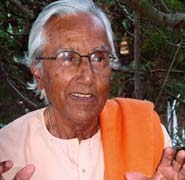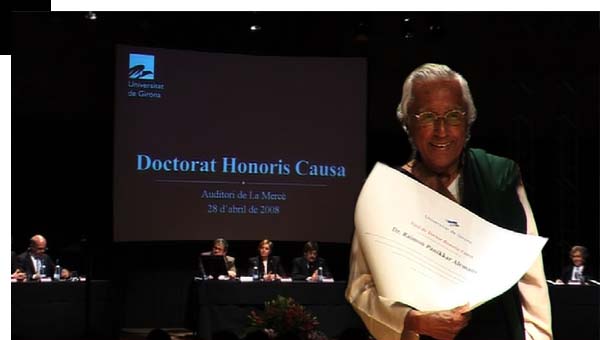



Laudatio of Raimon Panikkar Alemany
during the solemn academic ceremony of his investiture as Doctor Honoris Causa of the University of Girona
Presented by Prof. Josep-Maria Terricabras, sponsor of the new Doctor
It is an honour for me today to expound the merits of Raimon Panikkar Alemany on the occasion of his appointment as doctor honoris causa of our university in this solemn academic ceremony. Without a doubt Raimon Panikkar is the most internationally renowned catalan thinker alive today. His life and works testify to the huge thematic, geographic and linguistic scope of his thought which I will now present in summary.
Raimon Panikkar was born on November 3rd 1918 in Barcellona his father being an Indian of Hindu faith and his mother a Catalan Catholic. Thus, from his early childhood he was able to adopt, cultivate and speak of traditions within which he had always felt perfectly at home. He was ordained into the priesthood in1946 and in the same year he got Ph. D. in Philosophy and in 1958 in Science at the University of Madrid and in 1961 in Theology at the Lateran University in Rome. He has lived in India, in Rome (where he was a “libero docente” at the University La Sapienza) and in the United States. In 1966 he was invited as visiting professor at Harvard University and from 1966 to 1987 he divided his time teaching in USA every Spring Semester and doing his research in India.- From 1971 to 1987 he held the chair of Comparative Religious Philosophy at the University of California in Santa Barbara where he is still Emeritus Professor. In 1987 he returned to Catalonia and took up residence in Tavertet (Osona) where he has continued to hold courses, seminars and meetings on philosophical, religious and cultural themes as well as carrying out in-depth investigation into the different human traditions. He has published around fifty books, mainly in Catalan, Castilian, Italian and English which have been translated into French, German, Chinese, Portuguese, Czechoslovakian, Dutch and Tamil. For his part over the course of ten years he translated an anthology of a thousand pages of texts from the Vedas.
Panikkar has supervised about twenty university theses by students from all over the world, particularly during the time he spent in the United States. More than thirty theses on his thought have been written and some of them have been published. Panikkar has given courses in universities the world over as well as prestigious lectures such as the “Warner Lectures Series” and the “Gifford Lectures”. He has collaborated on the Classics of Western Spirituality (New York) Project which to date has published 76 volumes and also on Western Spirituality, which is comprised of 25 volumes, the three most recent of which are under his personal direction. The first volume of his Opera Omnia has just come out and will eventually run to of twenty volumes. The publication of these complete works has been envisaged in other languages and first of all in Catalan.
Apart from this immense academic activity Panikkar has been president of the “Pipal Tree” (Bangalore). He is the founder and director of the “Center for Cross-Cultural Religious Studies” (Santa Barbara, California) and of “Vivarium, Centre d’Estudis Intercultural” (Tavertet, Catalogna). Since 1993 he has also been president of the Sociedad Española de Ciencias de las Religiones (Madrid). In 1960 he was one of the founders of the NGO Pax Romana – with consultative status at the United Nations - which protects the rights and dignity of people all over the globe. He has also taken part in numerous international consultations for UNESCO and many other academic institutions. On two occasions he was special envoy for the Indian government on cultural missions to South America.
Over the course of his life Panikkar has received numerous prizes and awards among which international awards such as the “Premio spagnolo di letteratura”, (1961), Creu de Sant Jordi de la Generalitat de Catalunya (1999), an appointment as “Chevalier des Art set des Lettres” by the French government (2000), Medaglia della Presidenza della Repubblica Italiana ( 2001) and Premio Nonino 2001 ‘A un maestro del nostro tempo’. Furthermore he has received purely academic ones such as Dottore honoris causa of the University of the Balearic Islands. (1997), of the faculty of Theology of the University of Tübingen and the faculty of Sociology of the University of Urbino (2005). Every year the University of California awards a prize - –“The Raimundo Panikkar Award in Comparative Religions” to the philosophy student who takes his degree with the highest marks. At present a chair is being instituted in his name at the same university. Prestigious reviews have dedicated monographic issues to him and symposiums and study days have been organized to study his thought. The next International convention will be held in Venice from May 5th to 7th entitled “Mysticism, the Fullness of Life” on the occasion of the publication of the first volume of his Opera Omnia (with the same title).
Raimon Panikkar’s vast activity which we have only hinted at above, springs from his profound sense of the ideas and living which inspire it. Over a period of thirty years he has maintained intense contact with India which he visited for the first time in 1954. Talking about himself Panikar has said: “I started as a Christian, I discovered I was a Hindu and returned as a Buddhist without ever having ceased to be a Christian”. He has never been a conventional thinker: on the contrary he has infringed many schemes, conventions and prejudices. His intellectual development, between East and West, has allowed him to reflect a continuing philosophical dialogue between different traditions, ideologies and beliefs in his work. His substantial knowledge of the western philosophical tradition and his exceptional knowledge of oriental philosophical and spiritual traditions grant him a quite uncommon ability for inter-religious and inter-philosophical dialogue not only among usbut also on an international level. In times when eastern thought is gaining ground and followers among us, the figure of Raimon Panikkar stands out for his great authority as an expert, a rigorous and profound point of reference. In Panikkar, philosophy, which is constantly open to human reflection, finds an original thinker devoid of complexes because he “knows” what he is talking about and also because he proposes relationships and accepts differences which can only be debated by those who have experienced and understood them from within each tradition. Panikkar, who has wandered the world, proposes pilgrimage as a symbol of life but not as life itself because a pilgrimage should not only be an exterior experience but also an interior one.
This is exactly why he accepts the supremacy of practice, of life, of a life which unfolds in the present, in every moment and which is able to find the universal in the practical, in every detail. “My aspiration” – he has confided – “does not consist so much in defending my truth but rather to live it out”. His thought, inspired by the principle of advaita (neither monist, nor pantheist, nor dualist), suggests a vision of harmony and of concord which endeavors to discover the “human invariant” without destroying cultural diversities which all aim at the realization of the individual in a continuing process of creation and recreation. “The more we have the courage to walk new paths - he said – the more we must remain rooted in our own tradition, open to others who let us know that we are not alone and permit us to acquire a wider vision of reality”.
Dialogue is important for Panikkar but not purely mechanical or informative dialogue but rather what he calls “dialogical dialogue” which leads to recognizing difference but also to what we have in common, which in the end produces mutual fecondation. Dialogue is not a luxury for mankind, it is something absolutely necessary and inter-religious dialogue plays an important role. By this Panikkar does not mean an abstract theoretical dialogue, a dialogue about beliefs, he means a deep-reaching human dialogue in which one seeks the collaboration of the other for mutual realization since wisdom consists in being able to listen. Religion is not an experiment for him, it is an experience, an experience of life through which one is part of the cosmic adventure, with neither worry nor anxiety. This, for example, leads him to put forward the notion of “identity”. He was once asked during an interview: “Where do you find your identity?” His answer was:” By losing it rather than looking for it: by not wanting to hold onto an identity which has not yet been fulfilled and therefore is impossible to find in the past because it would only be a copy of something old. Life is a risk; adventure is radical innovation; creation comes about day after day, it is something absolutely new and unforeseeable”.
With his concrete yet also global vision of existence Panikkar defends harmony among one and the other, our harmony with that of nature and naturally with ourselves. He defends the sacredness of life as sacred secularity. Because everything is sacred, everything is inviolable and denounces how sensitivity towards the sacredness of matter has been lost. Ecosophy is the new wisdom of the earth. That which is human, that which is infinite or divine and that which is material are not three separate realities but three aspects of a unique and identical reality. This is his cosmotheandric or theandropocosmic intuition which reveals the ambiguity and the limits of any strictly scientific or cultural question. Finally we have come to experience the pathology of safety, that present day obsession, through the obsession with certainty. This is why Panikkar urges that philosophy should be alive, that it focus attention on polysemy, ambiguity, openness: because it can only foster awareness of freedom if it itself places itself above any type of servitude even if it is rational or rationalizing servitude.
Panikkar is certainly not a comfortable thinker because he is not always predictable, he is never conventional and constantly opens new perspectives, raises doubts, hopes and new expectations. This makes him a thinker of truth, a master of thought and a wise person. And, in the words of Cicero: “sapiens beatus est”.
I cannot conclude this presentation without making public a private and immensely generous gesture on the part of Raimon Panikkar: his decision to leave his impressive private library to the University of Girona. In exchange for his friendship and generosity I can solemnly guarantee, from this moment onwards, the commitment of this university, from today his university, to give this legacy continuity so as to expand and spread its contents.
For many reasons and for all this I propose that the title of doctor honoris causa is conceded and conferred on Raimon Panikkar.
